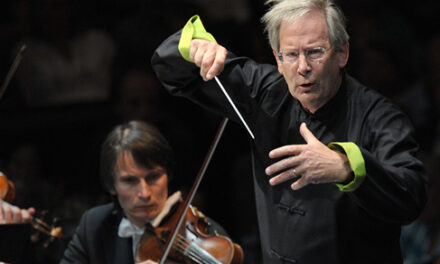Up in the mountains they’re a little squeamish about such mundane matters as promotion and publicity. So online at the Brevard Music Center website – or in the printed programs for their 75th anniversary season – the words “Brevard Music Festival” are never seen consecutively, though nobody calls the event anything else in normal conversation. Nor do these media make reference to the most exciting innovations of this year’s diamond jubilee program, namely the expansion of the festival to two additional venues. For the first time ever, festival opera programming is completely outside the Brevard Music Center campus, transported to the Porter Center at Brevard College. A week before we saw Kurt Weill’s Threepenny Opera at the Morrison Playhouse, the first time Brevard’s Janiec Opera Company has performed there, Scott Concert Hall had undergone a similar initiation with JOC’s production of Verdi’s La Traviata.
In olden days I would never trouble to drive from Charlotte to see such mainstream fare as Traviata. Big as it is, the Whittington-Pfohl Auditorium never provided the most pleasant of grand opera experiences. The orchestra pit between the audience and the stage increased the difficulty of seeing the nuances of the singers’ acting while that orchestral moat became an obstacle for those singers being heard. The W-P has a high roof over it, but the wings are wide open to the outdoors allowing a portion of the still-maturing singing voices to escape unheard into the mountain air. My fondest memory of the Pfohl was a poorly lit, faintly audible production of Benjamin Britten’s A Midsummer Night’s Dream, where the raucous crickets and cicadas added to the atmosphere.
It’s radically different at the Morrison Playhouse, which is so small that it can aspire to recapture the ambiance of the long-running off-Broadway production of Threepenny Opera that premiered in its Marc Blitzstein adaptation in 1954. Directing the show with a vigorous populist thrust worthy of Bertolt Brecht’s libretto, Dean Anthony pointed up the delicious grubbiness and decadence of the story and the manifold possibilities and advantages of the intimate Morrison space. An excellent design team helped to vivify Anthony’s vision, including lighting design by Jeremy W. Hodges, wigs and makeup by Nicole E. Bluhm, and costumes by Glenn Avery Breed. Foremost was the two-story scenic design by Bethany Wampol, which helped to keep the action moving smoothly through a variety of locales, including a brothel and a gallows, and subtly straddled two eras – the dawn of the Victorian Era, when the action takes place, and the end of the silent screen era, when Threepenny was written.
Elements of the Jazz Age were evident in profusion, hinting that Anthony has not only seen such saturnalia as Cabaret and Chicago but also profited immensely from their study. The cast obviously took to the idiom with great gusto, providing a breathtaking experience at such close quarters. Tenor Marc Koeck provided the most memorable vocal artillery to the cause in multiple roles but most importantly, armed with a faux hurdy-gurdy, as the narrating Street Singer. It was Koeck rather than baritone Joe Hager who sang the famous “Mack the Knife,” but if Hager didn’t have the strongest voice in the cast, he brought a devastating charisma to Macheath that elevated the entire production above the ordinary.
On the eve of Victoria’s coronation, the elegant cutthroat is done in by his dealings with the Peachum family. Don Juan that he is, Macheath has swept the young and voluptuous Polly Peacham off her feet. While Macheath’s appeal has extended to various young ladies and whores in the past, pure adoring Polly is one of only two he has married. Captain Macheath is notorious enough to be well-known to Polly’s parents, but the rogue’s character isn’t their chief objection to the nuptials. As chief of London’s underground begging brigades, Jonathan Jeremiah Peachum sees Polly’s elopement as the loss of an income stream, and his wife Celia, the bookkeeper for the Peachum syndicate, is on the same page. Mummy and Daddy are implacable in their campaign to bring Macheath to justice.
Juicy roles, then, for all the Peachums; Amy Cahill, with a plummy Jane Powell fullness to her soprano, was perfectly cast as the amorous and forgiving Polly, while baritone Michael Adams was a fine choice for projecting the venial nastiness of Polly’s pa. Katherine Harth, a flamboyant actress with a strong voice, was more problematical, throwing herself into Celia’s cockney vulgarity with such gusto that little of what she said or sang was as decipherable as her swaggering malevolence. As Jenny, the prostitute who snitches on old flame Macheath for the Peachums’ money, Anne Claire Niver had a smoldering stage presence that struck sparks whenever she was paired onstage with Hager.
Many was the time during this performance that I wished for aid from the large projection screen that loomed over the set’s upper level. It projected the song titles and replicated the Street Singer’s introductory narrative word-for-word. But a steadier stream of supertitles would have often helped during the solo vocals – or the denser choral interludes. I suspect that the Threepenny projection screen – or one like it – will get a more vigorous workout when Handel’s Alcina opens for its three-day run July 28-30. Inexplicably, the BMC website hasn’t been updated with a map that extends to the college campus. Friendly students at the Whittington-Pfohl box office were happy to print one out for me and offer directions. While 1 Brevard College Drive is the official address for the Porter Center, you’ll have better luck setting your GPS to 700 N. Broad Street.











